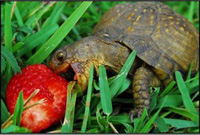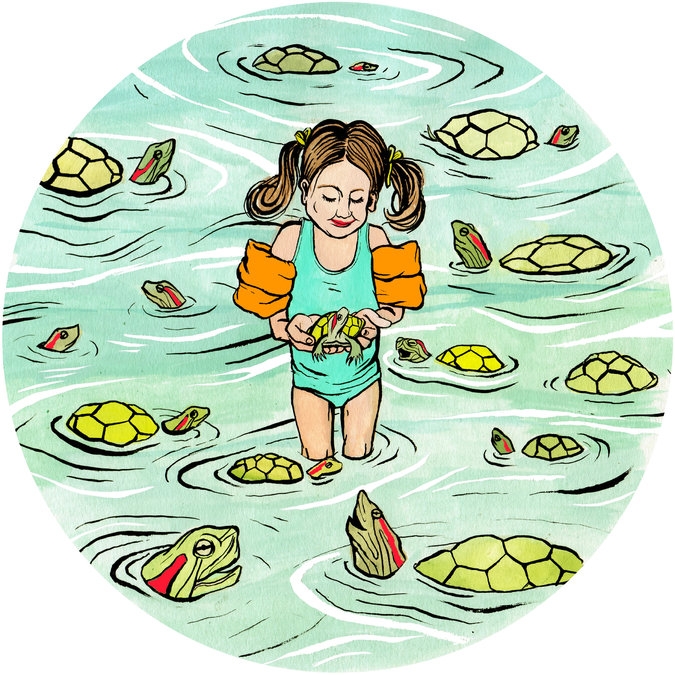The New York Times
March 22th, 2014
by Vanessa Barbara
Contributing Op-Ed Writer
SÃO PAULO, Brazil — AMERICANS are predatory. They invade other countries, prey on native populations and exploit their resources. They are typically voracious, opportunistic and highly adaptive. It is said they are filthy; they can tolerate living in polluted areas and can carry diseases to which locals have no immunity. As we speak, they are causing global ecological damage.
We are talking, obviously, about American red-eared sliders — semiaquatic turtles originally from the southern United States. Over the last few decades, these turtles (officially Trachemys scripta elegans) have spread around the world, prompting some to label the species the reptilian Norway rat (for biologists, this is practically an obscenity). It is listed by the International Union for the Conservation of Nature as one of the 100 worst invasive species in the world. The turtles can be found on every continent but Antarctica, in more than 70 countries and several islands, and in my São Paulo neighborhood.
(There are five of them living on my block. My favorite is a sweet one named Turtle Moses; for reasons that will soon become obvious, their owners will remain anonymous.)
The importation of red-eared sliders is prohibited in Brazil, the European Union and elsewhere. In Australia, people who keep them can face fines of up to $110,000 or five years in jail.
The problem goes back to the late 1950s and ’60s, when turtle farms in the United States started selling red-eared sliders. They seem very appealing as pets: Newborns are bright green little creatures barely larger than coins, with distinctive red stripes behind their eyes. They are cute, lively and easy to handle. However, in a year they double in size, reaching up to 12 inches in diameter. And they can live for 40 years.
They’re called “sliders” for their eagerness to slip off rocks and logs into water when approached. The owner’s required paraphernalia includes a large tank with a dry area, a heater, a powerful filter (turtles make a lot of waste, and their water has to be partially changed every week), two kinds of ultraviolet lamps and many bags of food pellets. That’s more work than many people signed up for, and the pets are often released to the wild.
In 1975 the United States Food and Drug Administration banned the sale of small turtles in hopes of preventing salmonella infections in children. Turtles of all sizes can carry the bacteria, but hatchlings are much more likely to be purchased. As a result, domestic sales dropped, and farms shifted their focus to international markets.
Sales boomed in the late 1980s, after the release of the cartoon comic “Teenage Mutant Ninja Turtles,” starring four brave (and pizza-loving) red-eared sliders. From 1989 to 1997, more than 52 million of the turtles were exported from the United States to foreign markets. When they reached adulthood, the pets were often abandoned at nearby lakes and ponds, introducing American red-eared sliders into other ecosystems.
Today, Australians may be considered the red-eared slider’s biggest predators. “They are tough as old boots,” Scott O’Keeffe, a biosecurity expert, told an Australian newspaper. “They can live in poor water quality and they’ll eat just about anything.” The Department of Agriculture and Food runs a fierce eradication campaign against those the news media calls “illegal immigrants,” “menaces” and “pests.” The official policy is to kill every red-eared slider they find.
Years ago, a newspaper celebrated the capture of a turtle on Christmas Eve: “Having eluded authorities since being smuggled into Australia, the ‘large and exotic’ offender was captured by a Melbourne housewife and will be put down.” By that point, the government had spent five years setting traps for this specific individual and even hired an expert to help take it into custody. “It is believed there is another, smaller red-eared slider turtle in Blackburn Lake,” the article warned. (I’d say “slider” is a suitable name for a notorious outlaw.)
American sliders are considered environmental pests outside their natural range because they compete against native turtles for food, mates, nesting areas and basking sites. They are way smarter and more aggressive than other species, like Trachemys dorbignyi, the Brazilian sliders.
Here in Brazil, owners can face fines of around $210 and up to one year in jail, but it is possible to hand them over and avoid prosecution. In theory, these proscribed turtles would be relocated to zoos or conservationist facilities, although everybody knows they’re full — no vacancies for Americans. According to a biologist from the Brazilian Institute of Environment and Renewable Natural Resources, euthanasia is not the standard policy here, but in a broader sense, it would be preferable to kill these turtles than to let them destroy a whole ecosystem. “In matters of ecological balance, individuals aren’t important,” he said to me.
Even in most of the United States their sales are banned, and in many places, euthanasia is the rule. The standard procedure for putting turtles to sleep, devised by the American Veterinary Medical Association, is rather gruesome: First you sedate the animal, then you decapitate it. Then the humane thing to do is to scramble its still-active brains, for they’re tenacious, stubborn, slow animals to die.
Run, Turtle Moses, run. And find yourself a better P.R. agent.



Muito legal. Recentemente adquiri um par de Trechemys dorbignyi de um criador registrado pelo Ibama, e ele me comentou as diferenças entre elas e a americana. Então passei a reparar e vi que elas estão em todos os lugares, em todos os zoológicos que fui aqui no Brasil eu as avistei no meio das dorbignyis.